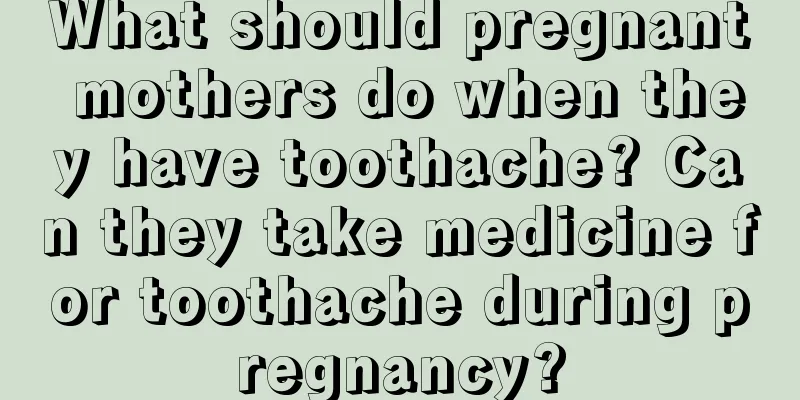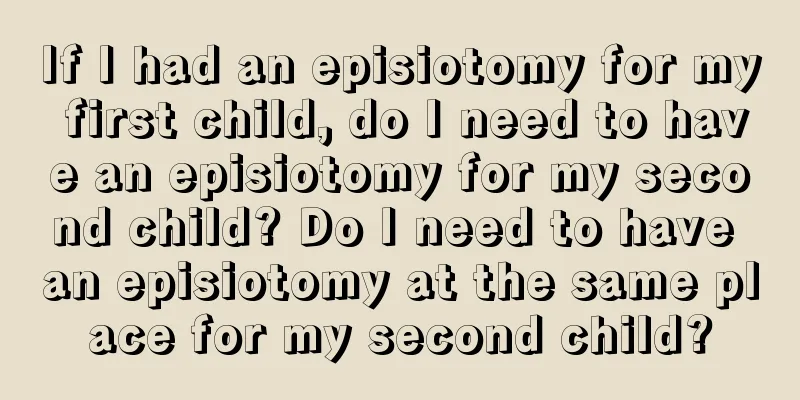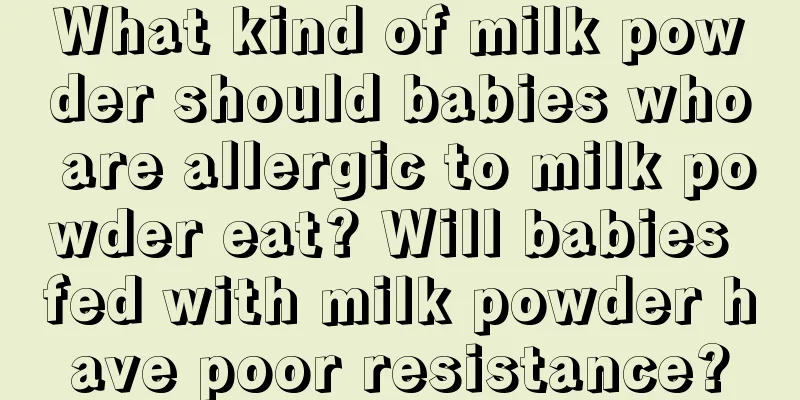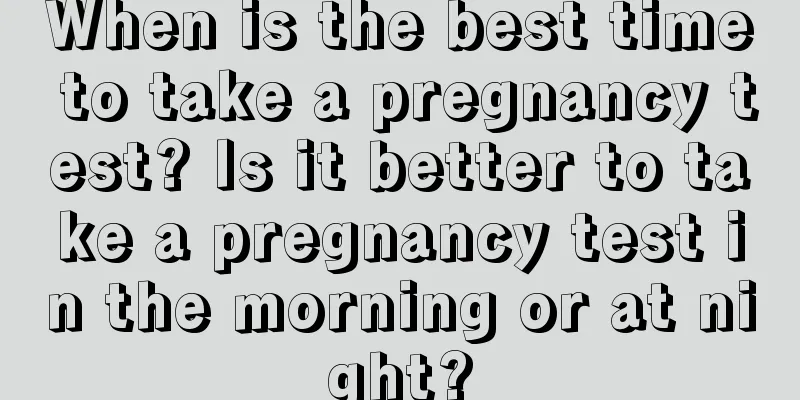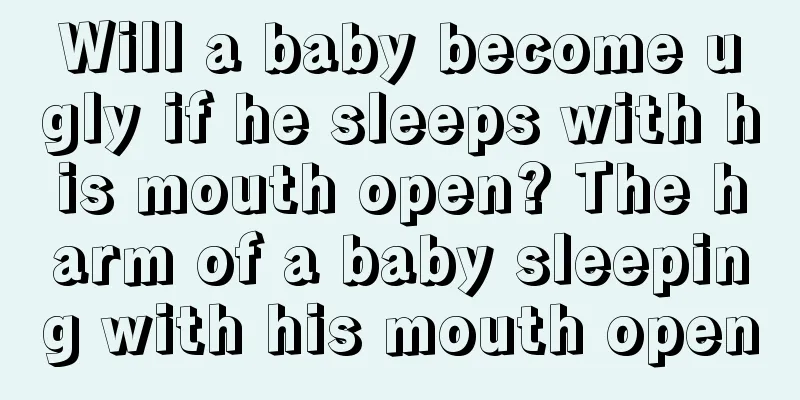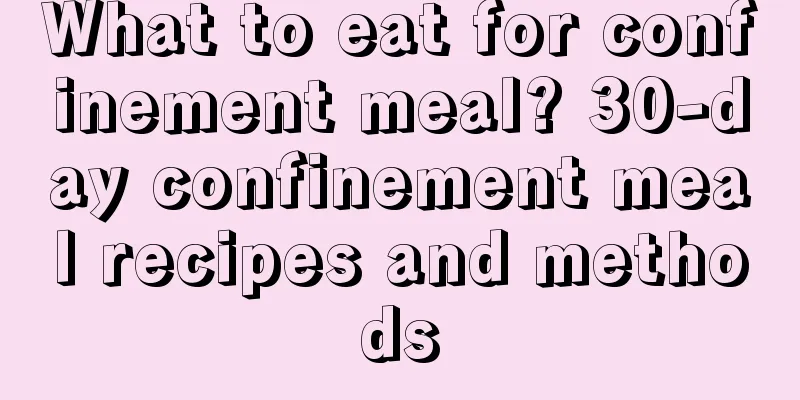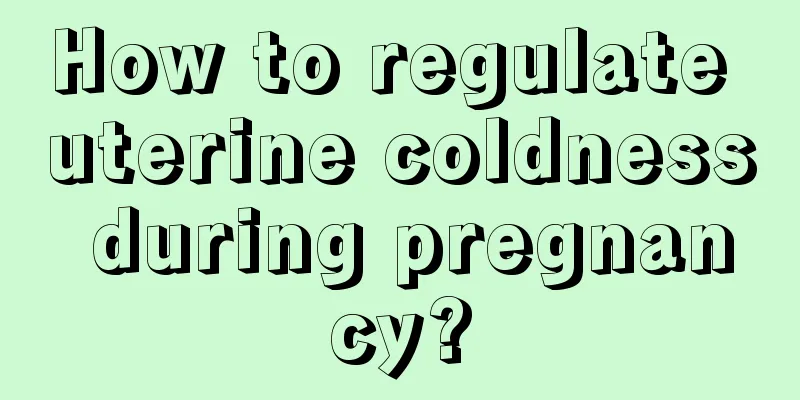How to effectively prevent baby choking? What are the misunderstandings about first aid for baby choking?
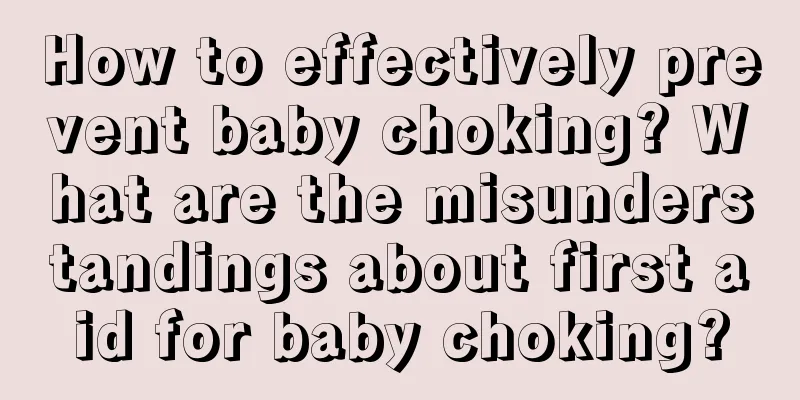
|
Because babies have small throats, it is easy for them to choke when eating nuts or small fruits. Once a baby chokes, the consequences are very serious, so parents should avoid giving their children foods that are easy to choke. Today we will review the first aid misunderstandings for babies choking, and pay attention to these behaviors that should never be done to babies. How to effectively prevent baby from choking1. When parents prepare food for their babies, they should choose appropriate food according to the baby's age. Soft pureed food is suitable for young babies, while for older babies, the food should be chopped, and the fruit should be pitted and mashed. 2. When the baby is eating, parents should create a quiet environment and do not disturb the baby while eating to prevent the baby from choking due to laughing or crying. 3. Parents should cultivate good dining habits for their babies. They should sit down quietly to eat, not eat while running, or eat while laughing or playing. They should chew food slowly and not eat in a hurry. 4. Do not feed your baby immediately when he is crying, as it is easy for him to choke. 5. It is best for the mother to be by the baby's side during meals and not to let the baby eat while lying down to reduce the chance of choking. 6. Parents should avoid feeding their babies jelly, candy and other foods that are easy to choke, and should also prevent others from feeding their children. Babies under 3 years old should not eat peanuts, twisted dough sticks, squid strips, nuts and other foods. Parents should keep these foods away from babies. 7. Before giving toys to your baby, check whether the toy parts are loose. At the same time, the toy should not be too small to avoid accidental swallowing. Let your baby develop good habits and not put objects in his mouth casually. 8. If the baby often chokes and coughs, the mother should be more vigilant, because this is a sign of esophageal cancer and should go to the hospital for examination as soon as possible. What are the misunderstandings about first aid for baby choking?1. Give water immediately after choking It is incorrect to feed water immediately after the baby chokes, because the food will expand after absorbing water and will further block the baby's throat, causing difficulty in breathing. In addition, the baby is prone to choking if drinking too much water. If the food is choked into the lungs, it may cause aspiration pneumonia or suffocation. 2. Pat your baby on the back It is unscientific to pat the baby's back hard after choking, because the esophagus and trachea are different. Although patting lightly helps the food in the trachea to be discharged, it is not conducive to the discharge of food in the esophagus. Instead, it will cause the food in the esophagus to sink deeper and deeper. 3. Use your hands to scratch your baby’s throat When a baby is choked on food, parents may use their fingers to dig into the baby's throat in a hurry, hoping that the baby will vomit out the food when he feels nauseous. This practice is not scientific, because digging the throat will only make the food sink deeper, which is not conducive to the excretion of food and may also cause harm such as edema of the throat mucosa. 4. Let your baby drink vinegar Some parents believe that drinking large gulps of vinegar can soften food. In fact, this is an inappropriate practice because vinegar is highly acidic and can easily damage the child's fragile esophagus in the process of making food slide down quickly. First aid for foreign body stuck in throat1. Accidental swallowing of medication If your baby accidentally swallows medicine, you should make sure to understand the side effects of the medicine. If the medicine is weak and has small side effects, you can let your baby drink milk to relieve the symptoms. Otherwise, you should take your baby to the hospital immediately and bring the container of the accidentally swallowed medicine so that the doctor can understand the situation. 2. Accidental swallowing of desiccant Desiccant is corrosive to a certain extent. If a baby accidentally swallows it, parents should be careful not to feed the baby water casually to avoid burning the baby's esophagus. The baby should be taken to the hospital for treatment in time. 3. Swallowing gum by mistake Although chewing gum cannot be digested, it will not stick to the child's stomach and intestines. If the baby swallows it by mistake, parents do not need to be too anxious. Just let the baby eat more crude fiber foods to stimulate the baby's gastrointestinal motility, and the chewing gum will be excreted with the feces. 4. Swallowing a pin If your baby accidentally swallows a sharp pin, fork, etc., you should not blindly perform first aid in this situation, but take the baby to the hospital immediately. 5. Swallowing buttons or coins If a baby accidentally swallows a round object such as a button or a coin, and the object is not stuck in the throat, you can let the baby eat more crude fiber vegetables to strengthen gastrointestinal motility and allow the foreign object to be expelled smoothly. If it is not expelled, you should take the baby to the hospital immediately. Baby dining safety precautions1. Choking Round or block-shaped food is more likely to cause choking in babies. Parents should arrange the shape of food ingredients according to the baby's age. Hard foods such as nuts and rice cakes can easily cause choking in babies, leading to suffocation. Parents should avoid feeding babies food that is too soft or too hard. In addition to the food itself, improper eating conditions are also one of the causes of choking. It is not advisable to feed babies when they are sleeping in a daze, or when they are playing excitedly or running vigorously. When food gets stuck in the baby's throat, the Heimlich maneuver should be used immediately for first aid. 2. Burns Eating food that is too hot can easily damage the baby's esophageal mucosa. Parents can let the food cool down a little before feeding it, or test the temperature first. When taking your baby out to eat, do not let your baby sit next to the serving area or aisle, otherwise the baby may be scalded by a soup bowl, teapot or even a hot pot that the waiter accidentally drops. When dining at home, do not let your baby enter the kitchen to avoid being scalded by oil pans or boiling water. If the baby is accidentally scalded, immediately rinse and soak the scalded area with cold water for more than 15 minutes, and then send the baby to the hospital as soon as possible. 3. Infection Feeding by mouth, blowing food to cool it before feeding, and sharing tableware may cause babies to be infected with Helicobacter pylori or other bacteria from the saliva of adults, causing oral ulcers, herpes, enteritis and other diseases. Therefore, parents need to be careful to avoid letting babies use adult tableware. |
<<: What is a baby comforter? Why do babies need comforters?
Recommend
Which country is Crest toothpaste from? Which is better, Crest toothpaste or Sensodyne?
Crest toothpaste is a brand we are all familiar w...
Can Haichang Care Solution be used to soak contact lenses? How long can Haichang Care Solution be used after it is opened?
Like contact lenses, cosmetic contact lenses need...
What should mothers eat when preparing for a second child in the beginning of winter?
The Beginning of Winter solar term represents the...
Are pears high in calories? Can you eat pears while losing weight?
Pears are a fruit with high nutritional value and...
What is a good breakfast for kindergarten babies? What is a nutritious breakfast for kindergarten babies?
The baby's nutrition should be taken care of ...
Can Manting anti-mite soap be used to wash hair? How effective is Manting anti-mite soap in removing acne?
Manting Mite Soap is a very common product on the...
I used a pregnancy test stick to detect pregnancy but I still have my period. What's going on?
Many women have the habit of using pregnancy test...
Is it necessary to take early childhood education? Is it necessary for babies to take early childhood education classes?
There are now many early childhood education inst...
Can pregnant women eat Guanyin vegetables? What are the benefits of eating Guanyin vegetables for pregnant women?
Guanyincai is a kind of vegetable. It contains a ...
Why does my baby always pull his ears? 6 reasons for pulling ears
Taking care of children is a very hard job, and w...
How long does it take to have sex after vasectomy? What should I pay attention to after vasectomy?
Sterilization is the most effective contraceptive...
Can pregnant women drink Isatis root when they have a cold? Pregnant women should be cautious when taking medicine
Whether pregnant women can drink Isatis root when...
What clothes should babies wear in autumn? Things to pay attention to when dressing babies in autumn
The weather is cool in autumn, and the temperatur...
How often should babies be fed with formula? How often should babies fed with formula eat?
After a newborn is born, some mothers will choose...
What is the reason for the itchy bumps on the child's body? What should I do if the child is allergic to the bumps?
Children generally don’t understand many things, ...
